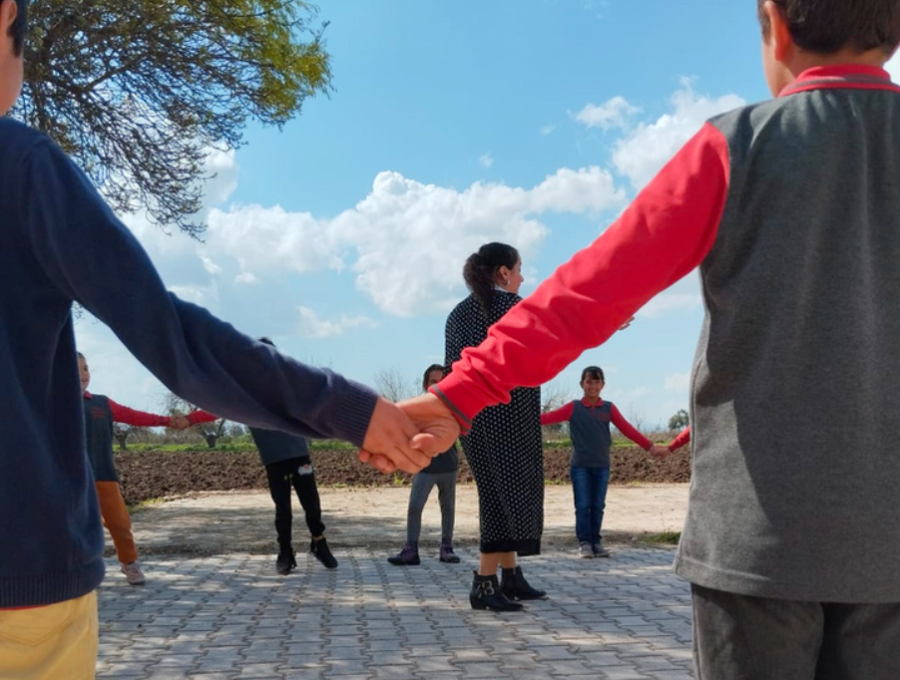
Rural Schools Transformation Network (Köy Okulları Değişim Ağı – KODA) is working to improve the quality of rural education in Türkiye by supporting teachers and students. The association received grant support from the Regional Recovery Support Program, launched under our Kahramanmaraş Earthquake Emergency Relief Fund, to empower teachers and the families of students in village schools, where education was disrupted after the earthquakes.
Please read the following interview for an insight into KODA’s work.
Can you tell us about the purpose and activities of your association?
Education challenges in rural areas are a global issue, not just a problem in Türkiye. Children in rural areas often face significant gaps in education quality compared to their urban peers. OECD’s PISA (Program for International Student Assessment) studies highlight that these disparities are particularly severe in Türkiye, primarily due to the lack of a tailored approach to rural education.
Many villages struggle with insufficient school access, and the reliance on transportation often means young children travel long distances daily. This situation creates a divide between local and transported students and complicates teacher-parent communication. Additionally, high teacher turnover in rural schools exacerbates the problem. Young teachers, often new to rural settings, face multi-grade classrooms, inadequate facilities, housing issues, and low parental involvement, leading to diminished motivation and feelings of isolation.
At KODA, our goal is to ensure quality education in rural areas by offering professional and socio-emotional support to teachers. We build teacher communities, provide mentorship, and run programs to prepare candidates for rural teaching. We also support families and develop learning programs to foster children’s holistic development. We believe rural areas hold significant potential for quality education and introduce innovative methods to teachers. Our aim is to show that active schools and skilled teachers contribute to social participation, resilience, and rural development.
We believe rural areas hold significant potential for quality education and introduce innovative methods to teachers.
Can you tell us about the activities and outcomes of the “Post-Disaster Rural Education Support Program” project that you implemented with the support of our Kahramanmaraş Earthquake Emergency Relief Fund?
Following the February 6, 2023 earthquakes, education in affected areas faced significant disruptions. By March 2023, over 21,000 new teachers were appointed to the region to replace reassigned teachers. These teachers, new to their roles, encountered the ongoing challenges of rural education compounded by the post-earthquake situation.
Our research revealed that education in many villages continued in container classrooms, and overcrowding occurred due to migration from more heavily damaged areas. Children faced trauma from debris that had not been cleared, and teachers felt increasingly isolated, especially in remote areas.
To address these issues, we implemented two main interventions through our project. First, we offered mentorship support, which provided emotional and practical guidance from experienced colleagues. This helped teachers handle the unique post-disaster challenges and improved their job satisfaction.
Second, we developed social-emotional learning (SEL) content for teachers. This material helped children manage their emotions, build healthy relationships, and stay resilient. Teachers reported that SEL programs reduced problematic behaviours, improved self-expression, and enhanced coping skills. Both teachers and students benefited from increased emotional awareness and resilience.
How do your post-disaster activities compare with your previous work? What have you learned from this experience?
KODA has long supported mentoring, social-emotional learning, and family engagement, particularly in earthquake-affected areas. Our previous work showed that mentoring and SEL training improved teacher-student interactions and family involvement. In response to the post-earthquake context, we adapted our approach to meet the specific needs of the affected areas.
For the first time, we combined mentoring, SEL, and family support in one project, which allowed us to address the earthquake’s impacts more comprehensively. We offered a year-long mentoring program, transitioning from one-on-one to group sessions to reach more teachers and foster networking.
We also provided SEL training for both mentors and teachers, revealing areas for growth among educators. Open dialogues about emotions positively impacted student recovery and continued education. Additionally, we trained families to improve communication with teachers and their children, which enhanced parental engagement and teacher-parent relationships.
Our detailed classroom visits enabled us to offer specific feedback and strengthen teachers’ connections with the program, reflecting the program’s positive impact on classroom practices.
We believe that teacher training, parental involvement, and positive public perceptions are crucial for supporting rural schools and creating systemic change.
What are your future plans and priorities? How has our grant support affected your future goals?
KODA plans to continue supporting teachers and families in rural areas to enhance educational quality and advocate for improvements. The effects of the earthquakes are still felt, and long-term programs are needed for full recovery. The project supported by STDV and Turkey Mozaik Foundation marked our first experience in post-disaster recovery, providing essential support to newly appointed teachers and strengthening school-family connections.
We aim to extend this project for at least two more years and develop policy recommendations based on our experiences to improve post-disaster educational interventions. We will also continue preparing teacher candidates for rural teaching and addressing rural education needs.
Do you have a message for the supporters of our Fund?
When supporting rural schools, people often think of sending supplies like boots and coats or improving physical conditions. At KODA, we emphasise the potential benefits of rural schools, despite their challenges. Rural schools offer unique advantages such as smaller class sizes, close school-family relationships, and proximity to nature.
To maximise these advantages, it’s essential to empower teachers and parents to turn challenges into opportunities. Insufficient resources can lower teacher motivation and drive families to migrate in search of better opportunities, harming rural communities’ social and economic structures. We believe that teacher training, parental involvement, and positive public perceptions are crucial for supporting rural schools and creating systemic change. We deeply appreciate the support from everyone who shares our vision and look forward to continuing our efforts to improve education for rural children.



